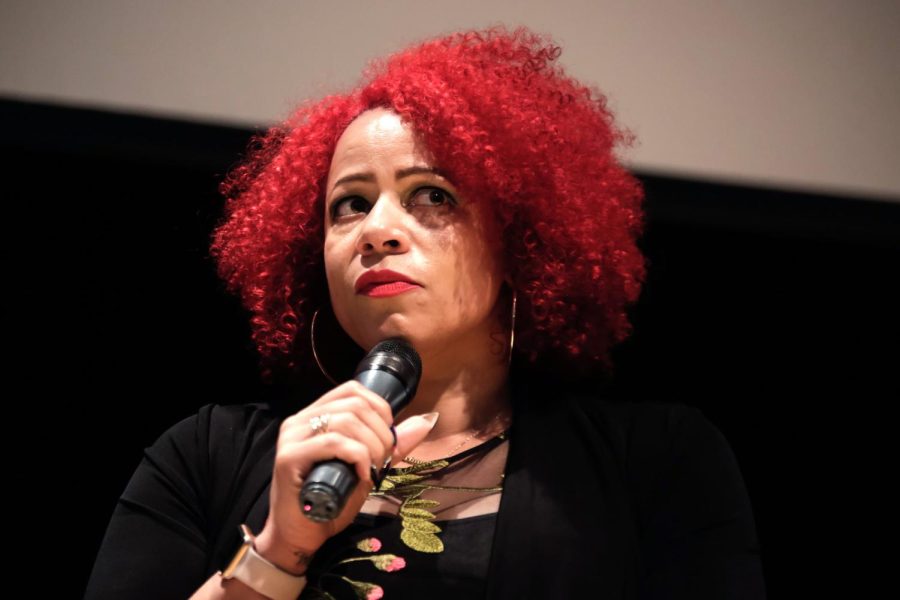Nikole Hannah-Jones talks race, reporting and The 1619 Project
March 24, 2022
In honor of Women’s History Month, Macalester recently welcomed acclaimed investigative journalist Nikole Hannah-Jones to a Zoom talk and Q&A session. Hannah-Jones spoke about her experience reporting on race and responses to The 1619 Project, an investigation on the legacy of slavery that Hannah-Jones produced for The New York Times Magazine, and her book by the same name expanding on that work.
Media and cultural studies professor Tia-Simone Gardner moderated the event. More than 350 people registered to attend the webinar for students, faculty and staff. Later in the afternoon, professor and chair of the history department Walter Greason moderated an event for alumni and community members.
Hannah-Jones fielded several questions about her work on The 1619 Project, a project that started as an issue of The New York Times Magazine comprised of investigative reporting, photos, poetry and fiction about the legacy of slavery in the United States. The piece traced the history of slavery’s impact on today’s U.S., from the prison systems to music to medicine.
The 1619 Project earned Hannah-Jones a Pulitzer Prize for Commentary and made waves across the country. But it also inflamed conservative commentators and lawmakers, receiving backlash for its assessment of the U.S.’s roots in slavery. Since the publication of the project, multiple states have attempted to ban The 1619 Project and Hannah-Jones’ book that expands on it.
Provost Lisa Anderson-Levy, who helped introduce the event, posed the first question, bringing Hannah-Jones’ attention to that backlash.
“I’ve spent a lot of time in the last year really trying to get my hands around the particular backlash against the 1619 Project, and then… what I consider to be a very successful propaganda campaign that we are calling anti-critical race theory, but that is really, of course, anti-history and anti-memory laws,” Hannah-Jones said.
Hannah-Jones credited the backlash to the shifting views that came with the wave of the Black Lives Matter movement after the murder of George Floyd in May 2020.
“We saw, with George Floyd’s murder, the largest mass protest for Black lives in the history of the world, but what’s more important about that [was] the nature of the protests,” Hannah-Jones said. “They were multi-racial, multi-generational, and occurring from big cities to all white rural towns… You actually were seeing a lot of movement in how people were understanding racial inequality.”
The protests, she said, started to alter the narrative of American exceptionalism that had long been accepted both by the public and in policy.
“Narrative affects policy,” Hannah-Jones said. “You have to have the narrative first in order for people to vote for certain policies, and if most people think we are a fundamentally equal society and Black people’s struggles are simply their own fault, they are going to support policies with that in mind.”
“If, however, you believe that we are not an equal society, that the anti-Blackness and this legacy of economic exploitation is what has led to this inequality and it is structural, you will pass policies and support policies for structural change,” she continued.
Hannah-Jones pointed to President Joe Biden’s win in the 2020 election and Democratic victories in Georgia as evidence for that change.
“We see these seismic shifts around the understanding of racial equality — and The 1619 Project is a primary text of that — and then we knew there was going to be a backlash, because if we study history we understand any perceived gains on behalf of Black Americans or marginalized communities is seen as a loss by those who have held power,” Hannah-Jones said.
Hannah-Jones brought attention to the fact that after that initial surge of support for the Black Lives Matter movement, momentum subsided again. Calls for police and prison abolition faded from the headlines, she noted; in Minnesota, multiple Black men have died at the hands of the police since Floyd’s murder.
“You don’t deconstruct a 400-year-old system in one year of protests,” Hannah-Jones said. “If we really want to be transformative, it’s going to take a lot more work that many of us don’t seem willing to do.”
Hannah-Jones herself has faced backlash for her work on The 1619 Project. Last April, the board of trustees at University of North Carolina declined to offer her tenure despite the tenure committee’s recommendation. After protest, the board extended her a tenure offer; Hannah-Jones opted instead to accept a position at Howard University.
Though her fame has come with more scrutiny, Hannah-Jones said it hasn’t inhibited her work.
“I don’t feel, creatively, my freedom is being inhibited at all, and I’ve certainly had that throughout my career,” Hannah-Jones said. “[In] my early career… I was punished for wanting to write about Black people, for wanting to write about racial inequality. I was told I would not be successful, that that was a sign of my bias, that that beat was too small, it would pigeonhole me, all of those things.
“No one is saying that now,” Hannah-Jones said. “I’ve taken a great deal of pleasure proving all of them wrong. You can produce one of the biggest works of American journalism and only focus on Black people.”















Bob Spaulding • Mar 27, 2022 at 4:01 pm
Nikole Hannah-Jones’ book has been thoroughly debunked by historians. Peter Wood, head of National Association of Scholars, wrote “1620: A Critical Response To The 1619 Project”, and was joined by many other historians in his critique. Even the New York Times, which sponsored her work, retracted (quietly), her version of history.
Your description of her presentation contained no hint of the backlash that has discredited her work. How much did Macalester College pay for her presentation? As an Mac alumnus I used to contribute to the college. No more.
Roger S Peterson • Apr 5, 2022 at 2:18 pm
I agree. Macalester will never get $$ from me until students embrace the concept of critical thinking. This speaker asserts that all of American history and its culture can be blamed on slavery. I once learned there are no simple solutions to complex problems, no easy yes or no answers. Where did I learn that? Macalester College.
Roger S. Peterson, class of ’67